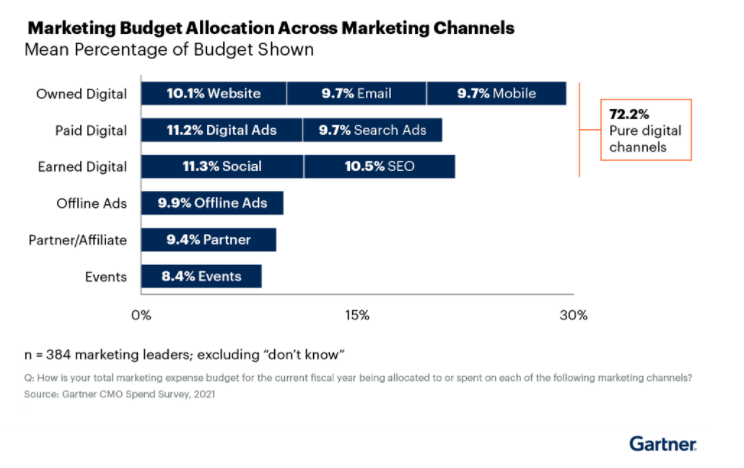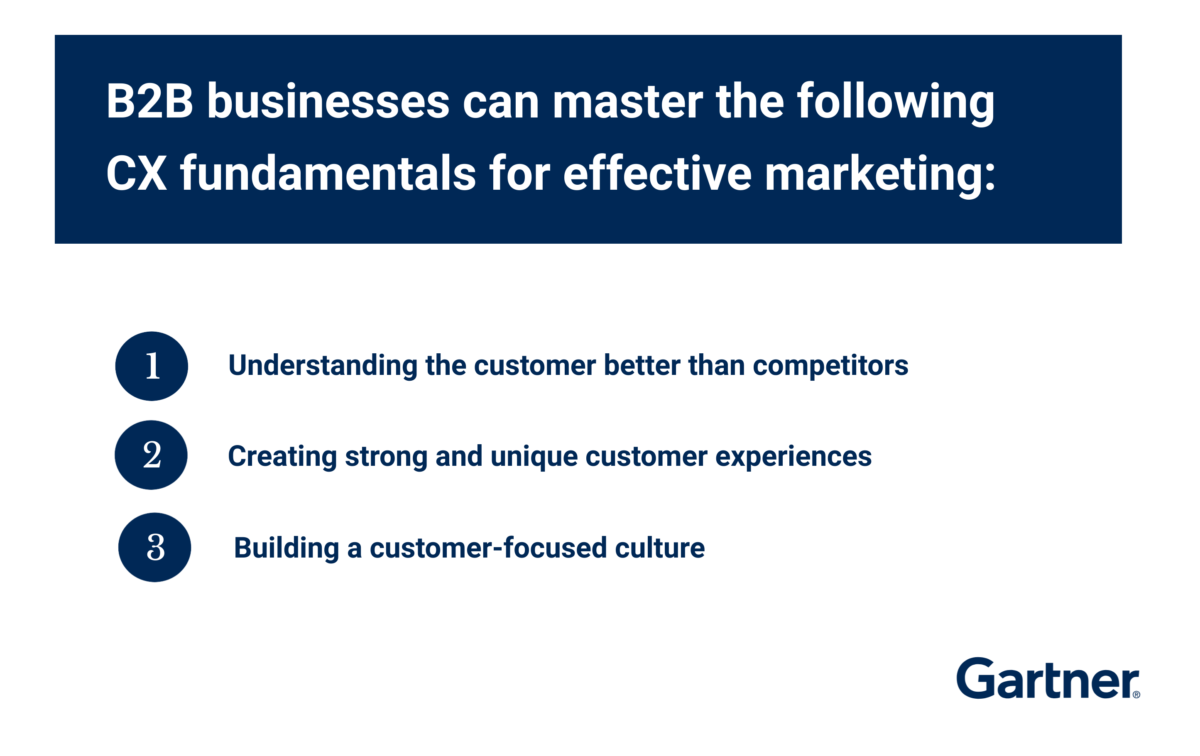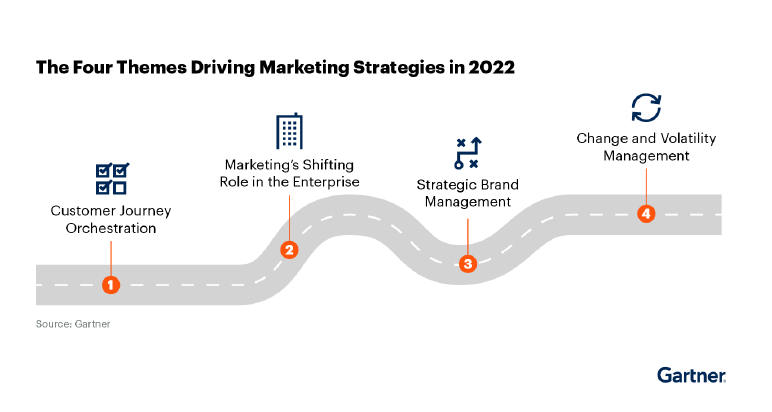The past year has been a challenging time for B2B businesses, with companies facing numerous obstacles to overcome. Budgets have shrunk, customers’ buying behaviors have changed, and in-person sales interactions have been replaced by digital channels. In response to these challenges, B2B companies have had to adapt and shift their marketing strategies toward digital channels.
However, this shift has presented new opportunities for businesses to reach a wider audience, engage with customers more effectively, and ultimately drive sales.
In this blog post, we’ll explore the top B2B marketing trends that are driving success for businesses in the post-pandemic world.
So, whether you’re a seasoned marketing professional or just getting started, keep reading to learn more!
Table of Contents
B2B Shift Toward Digital Channels
As the world becomes increasingly digital, businesses are following suit by shifting towards digital channels. Here are some key points to consider:
Customer preferences for B2B digital interactions
Customers now prefer to interact with businesses through digital channels. Whether it’s through a website, social media, or email, digital channels offer convenience and accessibility for customers.
80% of B2B sales interactions to occur via digital channels by 2025
According to a recent study, it’s predicted that 80% of B2B sales interactions will take place through digital channels by 2025. This highlights the importance of having a strong digital presence to remain competitive in the market.
72% of the B2B marketing budget allocated to digital channels
Another indication of the shift towards digital channels is the allocation of marketing budgets. On average, 72% of B2B marketing budgets are allocated to digital channels such as social media, email, and digital advertising, according to Gartner

Three ways digital channels help B2B businesses succeed
1. Reach
Digital channels provide B2B businesses with the ability to reach a larger audience compared to traditional methods.
2. Engagement
Digital channels offer a more personalized approach to engagement, allowing B2B businesses to tailor their message and content to specific audiences.
3. Scale
Digital channels enable B2B businesses to scale their operations with ease, allowing for faster growth and expansion.
Related Post: 40 B2B Lead Generation Ideas to Drive Your Business Forward
Prioritizing B2B Customer Journey
Importance of customer journey in B2B marketing
In the B2B space, the customer journey is an important aspect of the overall marketing strategy. This refers to the various touchpoints and interactions that customers have with a business throughout the buying process. By understanding and optimizing the customer journey, businesses can provide a better experience for customers and ultimately drive more sales.

Three ways customer journey helps B2B businesses
1. More loyal customer base
By prioritizing the customer journey, B2B businesses can create a more personalized and engaging experience for their customers. This can help foster a sense of loyalty among customers, leading to repeat business and positive word-of-mouth marketing.
By mapping out the customer journey and identifying pain points, B2B businesses can make targeted improvements to the customer experience, improving overall satisfaction and increasing the likelihood of customer retention.
2. Higher success chances for digital initiatives
Prioritizing the customer journey can also increase the success rates of digital initiatives. By understanding the customer journey and their needs at each stage, B2B businesses can create digital content and campaigns that resonate with their target audience. This can lead to higher engagement rates, click-through rates, and ultimately, more conversions.
Additionally, by analyzing data from customer interactions, B2B businesses can gain insights into customer preferences and behaviors, allowing them to refine and improve their digital strategies over time.
3. More business from existing customers and lower retention costs
By prioritizing the customer journey and creating a positive experience for customers, B2B businesses can increase the likelihood of repeat business and referrals. This can lead to more revenue from existing customers and lower costs associated with customer acquisition.
Additionally, by improving the customer experience and fostering customer loyalty, B2B businesses can reduce churn rates and retention costs, saving money on marketing efforts targeted at retaining customers.
Suggested Reading: How To Use Email Marketing To Win-back Customers (with examples)
Overall, prioritizing the customer journey is essential for B2B businesses looking to succeed in the digital age. By understanding the needs and preferences of their customers, B2B businesses can create engaging experiences, increase loyalty, and drive revenue growth.
4 Strategic Themes Driving B2B Marketing Strategies
The world of marketing is constantly evolving, and as a result, marketing strategies must also adapt to keep up with the changing landscape.
To succeed, B2B businesses need to focus on key strategic themes that will drive their marketing efforts forward. These themes include customer journey orchestration, marketing’s shifting role in the enterprise, strategic brand management, and change and volatility management.
By prioritizing these themes, B2B businesses can develop marketing strategies that are effective, agile, and well-suited to meet the needs of their customers and the broader marketplace.

Customer journey orchestration
- Importance of understanding and optimizing the customer journey
- Use of data and technology to track and personalize the customer experience
- Collaboration across departments to ensure consistent and effective customer interactions
Marketing’s shifting role in the enterprise
- The increasing importance of marketing in driving business growth
- Marketing as a strategic partner to other business functions
- Focus on delivering measurable ROI and contributing to revenue growth
Strategic brand management
- Importance of brand reputation and differentiation in crowded markets
- Development and maintenance of strong brand identities and messaging
- Use of brand guidelines and consistency across all channels
Change and volatility management
- Need for agility and ability to adapt to changes in markets, competition, and customer preferences
- Use of data and analytics to identify trends and make informed decisions
- Preparation for potential disruptions and crises with contingency plans and risk mitigation strategies
Social Media as a Versatile B2B Channel
In recent years, social media has become an increasingly important aspect of B2B marketing. With over 80% of B2B brands now active on social media, it’s clear that businesses are recognizing the value of using these platforms to reach and engage with their target audiences.
While there are many social media channels available, there are a few that B2B businesses should focus on in particular. These include LinkedIn, YouTube, and review websites.
Let’s take a closer look at why these channels are so important and how businesses can use them effectively.
82% of B2B brands are active on social media
According to a recent study, 82% of B2B brands are now using social media to promote their products and services. This is a significant increase from just a few years ago, and it’s clear that businesses are recognizing the value of using these platforms to reach and engage with their target audiences.
Social media can be a powerful tool for B2B businesses, allowing them to connect with potential customers, build relationships with existing clients, and establish their brand as a thought leader in their industry.

Three marketing channels B2B businesses should focus on:
1. LinkedIn for B2B marketing
LinkedIn is the largest professional networking platform, making it an ideal channel for B2B businesses to connect with potential customers and clients.
With over 750 million users, LinkedIn offers B2B businesses the opportunity to build their brand, share thought leadership content, and engage with their target audience.
By using LinkedIn’s powerful targeting options, B2B businesses can ensure that their content is seen by the right people, leading to increased brand awareness and potentially more leads.
2. YouTube for B2B marketing
Video content has become increasingly popular in recent years, and YouTube is the world’s largest video-sharing platform.
B2B businesses can use YouTube to share product demos, thought leadership content, and customer success stories.
By creating engaging video content, businesses can attract new customers and establish themselves as thought leaders in their industry.
3. Reviews websites for B2B marketing
Reviews websites, such as G2 and Capterra, allow customers to leave feedback about the products and services they have used.
B2B businesses can use these platforms to showcase positive reviews and establish social proof, making it more likely that potential customers will choose their products or services.
By actively managing their presence on these sites and responding to customer feedback, businesses can improve their reputation and attract more leads.
Content Marketing Strategy For B2B
In recent years, content marketing has become a critical aspect of B2B marketing. According to a recent study, 30% of marketing budgets are now spent on content creation. However, it’s not just about creating content. A defined and documented content marketing strategy is essential for success.
According to a study, the three most significant objectives for B2B content marketers are to establish brand awareness (87%), foster trust and credibility (81%), and educate their audience (79%). Interestingly, generating sales or revenue is ranked eighth in priority.
Importance of a defined and documented B2B content marketing strategy
A content marketing strategy helps ensure that the content you create is aligned with your business goals and objectives. It also helps you identify your target audience and determine the best type of content to create for them. Additionally, a documented content marketing strategy helps you keep your team on track and measure your progress toward your goals.
Different content formats that resonate with B2B prospects
B2B buyers consume a wide range of content formats. By understanding what types of content resonate with your prospects, you can create more engaging and effective content. Some popular content formats for B2B marketing include:
1. Blogs/Articles
Written content is still an essential part of content marketing. Blog posts and articles are great for providing educational and informative content to your audience. They can also help establish your brand as an authority in your industry and improve your search engine rankings.
2. Infographics
Infographics are a visual way of presenting complex information in an easy-to-understand format. They are highly shareable and can help improve engagement on social media platforms.
3. Images
Visual content such as images and graphics can help break up long blocks of text and make your content more engaging. They are also highly shareable on social media.
4. Videos
Video content has become increasingly popular in recent years. They are highly engaging and can be used to tell your brand’s story, showcase your products or services, and provide educational content.
5. Case Studies
Case studies are a great way to showcase how your product or service has helped other businesses. They provide social proof and can help establish trust with your audience.
6. eBooks
eBooks are longer-form content that provides more in-depth information on a particular topic. They can be used as a lead magnet to capture email addresses and can help establish your brand as an authority in your industry.
7. Email Newsletters
Email newsletters are a great way to stay in touch with your audience and provide them with valuable content regularly. They can also help drive traffic to your website and increase engagement on social media.
By using a mix of content formats, you can keep your audience engaged and informed at all stages of the buyer’s journey.
Conclusion:
The B2B marketing landscape is constantly evolving, and businesses must adapt to stay competitive.
By understanding the 12 B2B marketing trends discussed in this post and implementing them into your strategies, you can stay ahead of the curve and thrive in the digital era.
From embracing digital channels to prioritizing the customer journey, and from leveraging social media to creating a solid content marketing strategy, these trends can help your B2B business drive revenue, acquire new customers, and foster loyalty.
Additionally, aligning marketing strategies with your B2B marketing funnel can help businesses drive conversions and increase their ROI.
With the right approach and a willingness to embrace change, your B2B business can achieve its marketing goals and succeed in the post-COVID landscape.

Ali is a digital marketing blogger and author who uses the power of words to inspire and impact others. He has written for leading publications like Business2Community, Inc. Magazine, and Marketing Profs. When not writing, he enjoys spending time with his family.
